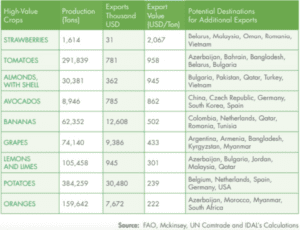The current multifaceted crisis engulfing Lebanon has started a very dangerous political and economic shift that could have a disastrous effect on Lebanon’s Liberal economic model in the long run. Indeed, the liberal model, focusing on personal freedoms, entrepreneurship, the free market, and minimal government interference, made Lebanon a unique place in the Middle East. In its golden age, from the early 1960s till 1975 Lebanon became a glitzy tourist attraction, the mecca of the banking, education, and health industries of the region, where the largest multinationals organizations and corporations had their regional headquarters in Beirut.
In those days, Lebanon enjoyed a thriving open economy, ruled by the free market, strengthened by the ease of doing business, and supported by its talented, multilingual, and dynamic young workforce, top-notch modern infrastructure, the best universities in the region, and top of the line hospitals. Lebanon also boasted a small but innovative agricultural and industrial sectors.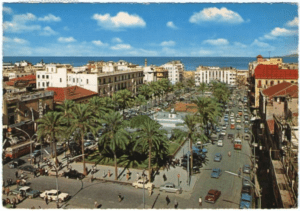
People flocked from all over the world, for tourism, to get an education, to place their money in the banks enjoying solid secrecy laws and low taxes, but mostly to do business, using Lebanon as a springboard and a gateway for the rest of the Middle East. The system worked, and Lebanon enjoyed one of the highest standards of living in the region, with a high GDP that steadily grew. Of course, there were problems, especially with the neglected periphery and agrarian regions, which created social injustices and subsequent unrest. But compared to the region and similar countries, the Lebanese had a higher standard of living and a strong GDP per capita. Then the war came and Lebanon entered a long and dark tunnel.
In the 1990s Rafik Hariri came back and resurrected the same formula and again it worked, maybe not as much as he hoped to, considering the region and the constant tension with the neighbors. There were two main issues: the Syrian presence and the constant scuffles with Israel. Thus, the country was not able to attract the necessary foreign investments, a problem compounded by endemic corruption and inefficiency. Nevertheless, the country flourished, in a fashion, its economy grew, and tourists starting coming back, but debt kept piling on, and it took several international conferences and aid pledges to keep it going. However, like the old saying went “when dark clouds gather in the Middle East, it pours in Lebanon!” and pour it did, wars, assassinations, and civil unrest. Rafik Hariri was killed and since then the country has been struggling with no clear goal.
Nowadays, some activists and many politicians, especially those riding the wave of populism have been feeding their supporters a readymade scapegoat, putting the blame on the liberal model. They have been calling for an overhaul of the economic system, calling for the adoption of a closed system with an emphasis on industrial and agricultural self-sufficiency, supported by a larger government role and five years plans, imposing subsidies and high tariffs, blaming the banking sector, the free market, the money exchangers for all the problems the country is facing.
Thus, with the generous support of Fnf, I will be writing a series of research papers to tackle each of these issues, refuting the claims, and proposing liberal solutions.
Self-Sufficiency, part ONE: Agriculture!
Let us start with self-sufficiency. The most used and abused concept in these dark days is the idea that Lebanon can somehow grow, produce, manufacture, and create everything it needs locally. Economy and politics are intimately linked to geography and demography. No matter what the Lebanese government does, and how much money it throws at this issue, the fact will remain that Lebanon can never grow enough to feed itself.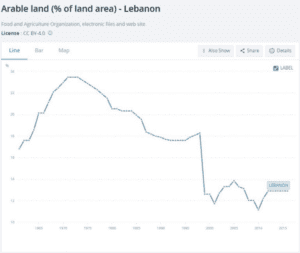
Indeed, Lebanon’s total arable land has been dropping from 21% in 1967 to 12.9% in 2016 [1], standing at 132,000 [2] Hectares. Assuming that the Lebanese government can somehow impose the growing of wheat on all available private lands while increasing yield to an above-average yield of 4 tons per HA. All these impossible efforts will result in the production of around 528,000 tons of wheat, which will fall way short of satisfying local demand that topped 1.6 million tons in 2018 [3]. Thus, no matter what happens, Lebanon can NEVER be self-reliant on all basic food staples.
Moreover, focusing on one or two essential produce is very dangerous and economically unsound. Dangerous because if there is a disease outbreak, or climate occurrence the effect on a few crops could be catastrophic, destroying the whole harvest. As we witness at every harvest time, the price of the produce collapse and farmers start losing money because of overproduction and oversupply (the yearly saga of apple producers [5] is the best example: Many farmers grow crunchy and tasty apples in the orchards in the mountains, unfortunately, with limited export capabilities -a subject worthy of its own article- and oversupply the price collapses and usually the government has to step in and buy the bulk of the harvest.)
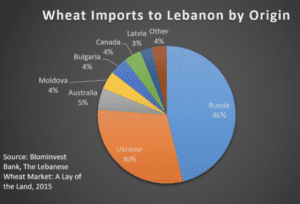 Moreover, Lebanon should not depend on one or two countries for all its food imports. Indeed, going east, like many are calling for would not work nor be efficient or ensures its basic food securities. Lebanon was, is, and should always be part of the global marketplace, trading with many different countries, finding the best deals, diversifying its trade partners, and making sure that it doesn’t fall under the mercy of any single suppliers!
Moreover, Lebanon should not depend on one or two countries for all its food imports. Indeed, going east, like many are calling for would not work nor be efficient or ensures its basic food securities. Lebanon was, is, and should always be part of the global marketplace, trading with many different countries, finding the best deals, diversifying its trade partners, and making sure that it doesn’t fall under the mercy of any single suppliers!
It is important to note, that this paper is not arguing against reviving the agricultural sector that has been neglected for decades. On the contrary, the sector is very important (contributing up 1.78$ billion to GDP in 2018, and 5% of total exports) [6] and can create thousands of jobs. But the way forward if not a return to the old traditional agriculture, of small farmers growing usual crops and then trying to find a seller, usually locally. Especially, when the Lebanese agricultural sector already suffers from low productivity and the growing of low-value crops [7].
Another important idea that has been heavily propagated, is the encouragement of ordinary citizens and farmers to grow their own food, to increase their resilience, and to keep the specter of hunger away. For individuals, is it a worthy call, especially from a liberal standpoint, that firmly believes in the importance of empowering individuals and allowing them to grow economically and financially. But it is critical to point out that growing sustenance crops is an old and outdated model, with proven weakness and pitfalls. The amount of time that would be spent on such endeavors should be applied elsewhere, in activities that bring much more income.
Moreover, inexperienced individuals, especially city dwellers are faced with a steep learning curve before being able to grow their own food, the famine caused by China’s Cultural Revolution is a definitive example, when Mao sent millions of city dwellers to the countryside to farm, causing widespread famine and millions of casualties. Market forces should also be considered in such plans, inexperienced individuals would usually choose easy to grow and to harvest crops, oversupplying the market and crashing the prices, harming themselves, and the established farmers. The model that should be used in this case, especially for farmers, is the cash crops model, with an emphasis on exports! This model and its applications, and other liberal solutions will be discussed in the next section.
Proposed solutions:
I am proposing a modernization of the agriculture concept, using the strength of Lebanon, from education, climate, technological advances, know-how, and experience to create a niche [8], create a line of unique products that would sell at a much higher price and profit margins. A lot of efforts should be applied to adopt Gap (good agricultural practices), and traceability to boost exports, and introduce new more appealing breeds for both exports and local consumption (for example Lebanese farmers only grow golden and Starken apple varieties, whereas there are more varieties), allowing the agricultural sector to reach its full potential and help the overall economic growth, especially with exports to bring much needed fresh dollars! [9]
- Limiting the state role
In fact, in this sector and in most others, it is imperative for the state to limit its interference, remove any subsidies and -and this is key- eliminate bureaucratic and regulatory red tapes that stifle innovation and competition, creating aberration like the tobacco ‘Régie’ (a government institution under the Finance ministry control), that have proved to only be a drain on the state resources, with minimal benefits. (indeed, the Régie directly subsidies the tobacco by buying it from farmers and then selling it at a loss in the world market. Totally subsidies amounted to 51$ million in 2008 and are still ongoing). The state role should be limited be to offer low or even zero-interest loans, encouraging the banks for once to have a real positive role in the economy, and creating and strengthening the advisory and legal framework to help the farmers abide by the regulations and requirements to export! These concepts will be further developed in a dedicated part focused on subsidies and tariffs.
- The French ‘Terroir’ model
Additionally, the French ‘Terroir’ or ‘appellation d’origine controlee’ model would work well for Lebanon. In an overconnected globalized world, millions of tons of foodstuffs are produced all over the globe and much cheaper than in Lebanon, but very few have the Bcharee Lebanon staple, or the Bekaa for wine, or Ersal for the best Cherries, for example! The idea could be pushed further, imagine small bio orchards producing the most tasteful apples in the world, focusing on taste, added value, health, and region of origin, rather than on mass production and maximum yield. Using state of the art technology invented in Lebanese universities, which are the best in the region, using AI, robotics, and data science to maximize production and quality, and then exporting the products all over the world.
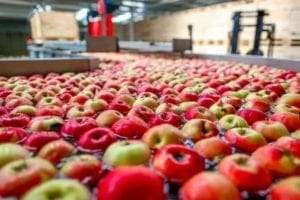 Here I would like to highlight a great success story of focusing on quality and exporting: Quadra Machinery. Their story goes as follows “Quadra started with a group of engineers who were motivated by the apple crisis a few years back, where the country’s entire apple crop was left unsold. While still in university, they created a sorting machine that could simplify the mission of improving the quality of apples designated for export.” [10]
Here I would like to highlight a great success story of focusing on quality and exporting: Quadra Machinery. Their story goes as follows “Quadra started with a group of engineers who were motivated by the apple crisis a few years back, where the country’s entire apple crop was left unsold. While still in university, they created a sorting machine that could simplify the mission of improving the quality of apples designated for export.” [10]
Close to these farms, small agro-industrial workshops, wineries (already a booming sector) run by villagers and farmers from the region, would turn these products in food staples that are eagerly bought worldwide, from jam to Halawa, to hummus, olive oil and to wine [11]. Lebanon is not going to be the number one producer of Jams, but the Ersal Cherries Jam could easily become an internationally recognized staple of quality and origin would be sold at a much higher premium, indeed the future success of the Agro-industry dictates a shift in production towards high-quality products [12]. This idea will be developed in the next part of this Serie, focused on the industry. Moreover, with the current devaluation, such projects have become much cheaper, as the labor costs in Lebanon have considerably dropped.
- The Magic formula

Meanwhile, already established farmers should start moving away for traditional crops, towards high value ready to export cash crops. In this regards, a worthy initiative would be to pair up young tech-savvy entrepreneurs with experienced farmers, creating modern SMEs focused on growing high yield and high-value crops focused on export, using the know-how and the networks and outreach capabilities of the youth, while simultaneously utilizing the extensive experience of the Lebanese farmers and their know-how of the terrain, climate, and diseases and pests that are prevalent. Allowing commercial farmers to unlock their export potential by improving quality standards and transitioning to higher-value crops (like Avocado, strawberries…), while improving productivity through the use of technology and modern methods. [13]
Conclusion:
Finally, there is no instantaneous solution! But this series of articles will show that despite everything, the only way forward for Lebanon is still the Liberal model! Unleashing the power of free individuals to grow their business, innovate, reach their full potential, guided by the forces of the free market and open competition, away from the heavy-handed state interference, with a focus on exports! Such small and medium projects would be supported by startup accelerators, and savvy investors, employing highly talented Lebanese youth, modernizing an economy still suffering from outdated and inefficient practices!
References:
[1]https://knoema.com/atlas/Lebanon/topics/Land-Use/Area/Arable-land-as-a-share-of-land-area
[2] https://tradingeconomics.com/lebanon/arable-land-hectares-wb-data.html
[3]https://www.world-grain.com/articles/12654-lebanon-milling-wheat-supply-threatened
[4] In the words of a prominent Agri expert, Mrs Souhad Abou Zaki, “In principle, Lebanon can grow its wheat, but it cannot be self-sufficient for many reasons.” https://www.executive-magazine.com/agriculture/lebanon-needs-to-lower-its-import-dependency
[5]http://www.businessnews.com.lb/cms/Story/StoryDetails/2824/Cabinet-subsidizes-apples
[6]https://investinlebanon.gov.lb/Content/uploads/Publication/200402102253989~IDAL%20Agriculture%20Sector%20in%20Lebanon%20Factbook%202020.pdf
[7] https://www.economy.gov.lb/media/11893/20181022-1228full-report-en.pdf page 58
[8]“Lebanon has the best opportunities in niche markets”, https://www.cbi.eu/sites/default/files/market-information/2018_vca_lebanon_ffv.pdf
[9] Interview with Mr. Munir Bissat the Secretary for foreign affairs of the Association Of Lebanese Industrialists and owner of an agro-industrial factory of Halaoui in Lebanon.
[10]https://berytech.org/quadra-machinery-from-university-project-to-cross-sector-solutions-provider/?utm_source=facebook&utm_medium=postpromotion
[11] https://blog.blominvestbank.com/wp-content/uploads/2016/01/Hidden-opportunities-in-the-Lebanese-economic-sectors.pdf
[12] https://blog.blominvestbank.com/wp-content/uploads/2016/01/Hidden-opportunities-in-the-Lebanese-economic-sectors.pdf , page 7
[13] Lebanon economic vision, Mckinsey Report 2018, https://www.economy.gov.lb/media/11893/20181022-1228full-report-en.pdf
Contact
Phone
Tel: +32 (0) 2 801 13 57-58
Address
Beyond the Horizon ISSG
Davincilaan 1, 1932 Brussels


